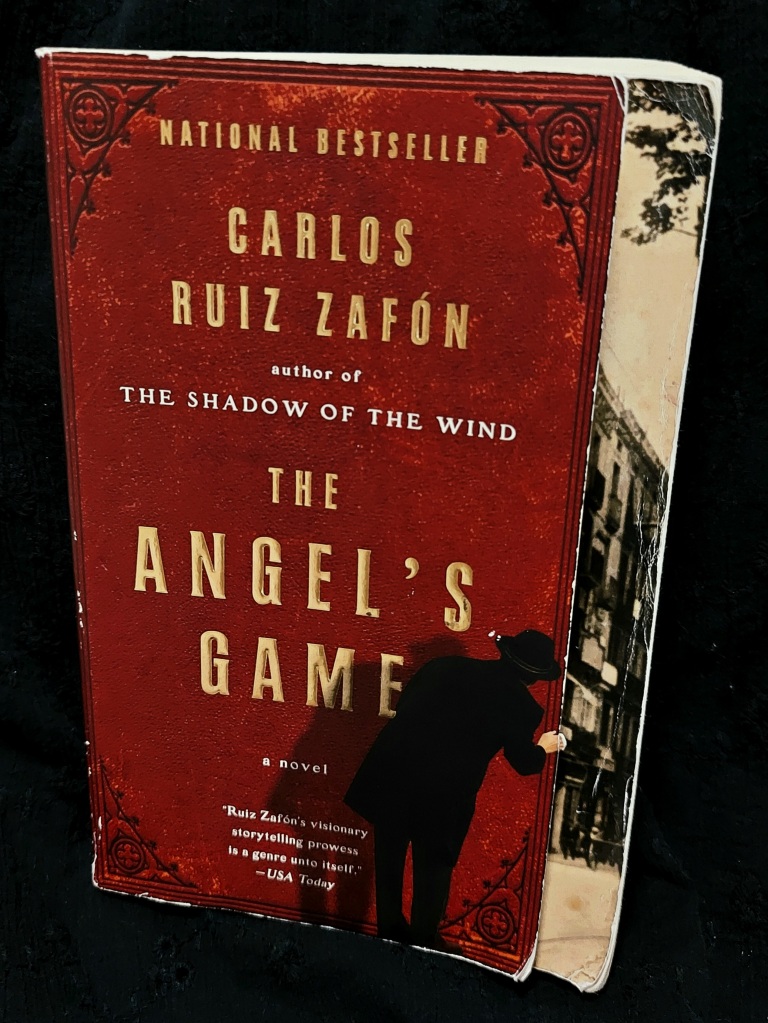Themes
- Spain, Barcelona, turn of the century, pre-Civil war Spain
- authors, noir style, fiction, antiquarian booksellers
- nostalgia, love and loss, dreams and delusions, insanity, occult and death
“A writer never forgets the first time he accepted a few coins or a word of praise in exchange for a story. He will never forget the sweet poison of vanity in his blood and the belief that, if he succeeds in not letting anyone discover his lack of talent, the dream of literature will provide him with a roof over his head, a hot meal at the end of the day, and what he covets the most: his name printed on a miserable piece of paper that surely will outlive him. A writer is condemned to remember that moment, because from then on he is doomed and his soul has a price.”

The sequel to Shadow of the Wind begins perhaps as much as three decades before the events of its predecessor. Probably about a decade ago, I picked up that very book, having been drawn to it at a bookstore. I did not know the author, whose work is expertly translated from Spanish. Being limited only to English myself, I can attest to that. No amount of ZafÓn’s poetry or eloquence is lost. Not a speck. My husband had attempted to listen to his work via audio book and stopped for this reason. He said listening to it was like hearing poetry spoken by someone in love with words and he had to appreciate it in the proper way: picking up a book, smelling and touching his pages, savoring those words.
The Angel’s Game, translated again by Lucia Graves, extends all the beauty and love of words over 500 pages. A love letter to Spanish history and architecture of over seventy years ago. Knowing nothing of international history, I was able to gain a cursory understanding of events, the impact of them within a world half a world away.
The Angel’s Game is the memoir of Martin, a young man who repeatedly sells his soul to become the writer he has always dreamed he would be. One to a publishing company, churning out penny dreadfuls and pulp fictions under the pseudonym Ignatius B. Sampson; and lastly to a phantom with the air of a charismatic devil to offer him salvation at a price. Martin accepts with an air of skepticism but when the mysterious publisher Corelli delivers the impossible, Martin begins to delve into who this man is or had been. Involved are a few friendly faces from Shadow of the Wind, and an insane midnight visit to the “Cemetery of Forgotten Books” which seems to link ZafÓn’s literary world. This Faustian tale seamlessly blends the true world of Spain after the turn of the century, beginning in 1917; with the candle lit delusions of a man on the fringes of his own life.
As the world around Martin darkens it aligns itself with the gothic novels he creates, further blurring the lines between reality and fantasy is the lively cast of secondary characters. Aside from the devilish Correlli, the cast shines out like gems within the murk: the grandiose and dramatic Pedro Vidal debonair son of the wealthiest man in town, the washed up ex-cop Salvador, Martin’s strong-willed assistant (and a character that those who have read The Shadow of the Wind finally get to meet) Isabella, and the unforgettable and sweet Cristina daughter of the Vidals’ chauffeur. ZafÓn possesses the ability to give each character a soul as they steal across countless pages, making declarations and weaving their personalities into the air of each scene. None of his books would be complete without them.
As I turned its final pages, there was so much to take in. I felt the thrill and fun of falling headlong into another noir-style tale of the Spanish underworld that exists in secret beneath the cobblestones of cities I have never imagined. Their history so layered and old that I was astounded at how fast I had fallen into the drama unfurling. I believed that at the end, I was truly reading the conclusion not of The Angel’s Game, but of City of the Damned as Martin would have had it. Sending himself off into the sunset a broken yet hopeful phantom with his back to the city that raised him, loved him, and ultimately destroyed him.
If you feel so compelled, give in to the temptation and intrigue of poetry within someone else’s madness. Asking yourself what you might give in exchange for a dream.
